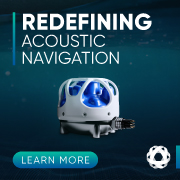
UDT 2024 Preview Q&A
22.03.2024
Undersea Defence Technology (UDT) is an annual conference and exhibition that has been running for many years. This year we have the great pleasure of going to ExCel in London, co-located with another Clarion event; the International Training and Technology Exhibition (ITEC). UDT is the largest event solely dedicated for the undersea defence and security industries. We will continue what we were looking at in Rostock last year and acknowledge the inherent difficulty in navigating the underwater landscape.We have interviewed Adrian Pierce, Defence Advisor at Clarion, to learn more about this year’s UDT.

Adrian Pierce: We know the complexities of the physics and oceanography of the Ocean: it’s grey, it’s over the horizon, and now of course the geopolitics have got worse and far more complicated. Everything we were talking about before at previous UDT, what was going on in the Black Sea, and in the Baltic Sea with Nord Stream, and the impact it had on underwater critical infrastructure, has now been exposed even further, with the more recent developments in the Black Sea. We now also have developments in the Red Sea, and you can take that further to the South China Sea and the China-Taiwan situation. Hence, defence is moving up on the agenda, and of course the underwater domain is very firmly part of that conversation.
Recently, the International Cable Association stated their message on the recent cable breaks in the Gulf of Aden. They are worried about the threats from the Houthis, although nothing of course has been proven yet, or if the Houthis even have the capability to cause such sort of event. If anything, then a conjecture of a dragging anchor of a merchant vessel is far more likely to have done the damage. However, the point is that if there is an attack on critical infrastructure, then that affects us all in one way or another. The fact that it happens underwater, and infrastructure needs to be secure, means that UDT is coming along at a very convenient time shall we say. It is a subject matter that is something of interest despite its complexity.
To try and address some of that complexity the conference will focus on six different areas:
- Platform design
- Sensors and processing
- Weapons and countermeasures
- Uncrewed and remotely piloted autonomous systems
- Operation drivers
- AI and big data analytics

UDT 2023 (Courtesy of Clarion)
Richie Enzmann: These geopolitical challenges you mentioned, are they reflected in any special way at UDT, or just in general referring to the threat to underwater infrastructure?
Adrian Pearce: I think in a general way. The timing of the event is quite prescient, and on the second day we have a panel session with the Royal Navy about their transition into the autonomy and the underwater battlespace. This idea of the underwater network, which has been set out across NATO, not just only in the UK, it should be of great interest and relevance that the RN is talking about this. That is of interest geopolitically of course because we have this issue with critical underwater infrastructure in the North-East Atlantic, the Baltic, but also more Globally. We also see what is going on in the Black Sea and the way the Ukrainians are using autonomy to disrupt and destroy elements of the Russian fleet very successfully. We see as well how the Houthis are using uncrewed vehicles to disrupt the merchant shipping in the Red Sea with its geopolitical impact, so all that is relevant, and I think you will see direct links to that in some of the conversations that will be going on at UDT.
The exhibitors are very interested in showing their wares because there is increased interest and demand. That’s why you will also see organisations like the GUH, with their growing interest in the security of underwater infrastructure. The actors that are interested in undersea defence are growing: not just the traditional ones, but also the commercial ones have interest in the impact of it as well.
Richie Enzmann: Will there be some dual use technologies on show?
Adrian Pearce: Yes. There will be dual use technologies there and interest in them from the military.

UDT 2023 (Courtesy of Clarion)
Richie Enzmann: You mentioned the Ukraine and the Black Sea that they were quite successful in using the unmanned surface vessels. Would USVs be a focus as well?
Adrian Pearce: If you look at narcotics trafficking, that started on the surface and then moved onto semisubmersibles and now they are getting close to, if not using submarines. The point is that you use and further develop the technology. The Ukrainians started using unmanned vehicles on the surface and then they have been developing semisubmersibles making full use of commercial and open technologies, so I would be amazed if they are not looking at vessels that spend most of their time as submersibles, if not submarines. Of course, how they do the final attack is another question because it is technically difficult and then you have the targeting issue. I don’t know what the true answer is, but I would be amazed if it’s not something that people are getting very close to.
Richie Enzmann: Recently I have also come across technologies where the vessel could wait submerged and wait for an attack.
Adrian Pierce: Yes, At UDT Rostock, last year, there were demonstrations of underwater vehicles that had the ability to loiter and do surveillance for some time. So that wouldn’t take much to bring it to the state where you can deliver a weapon with it.

UDT 2023 (Courtesy of Clarion)
Richie Enzmann: Please tell us a bit more about the panel discussions and themes that will be taking place at UDT.
Adrian Pierce: The panel on Day 1 is looking at a strategic issue that affects all and is in partnership with ITEC. That issue is of course people and the development and retention of relevant skills. For the Day 2 Panel, the discussion will be about how the Royal Navy is looking for the transition into being an autonomous force. The Keynote Address there will be made by Rear Admiral James Parkin, the Director of Development at the RN, and that will be followed by a Keynote Panel discussion predominantly by naval officers, civil servants, and people coming across not only from the traditional Royal Navy, but other parts of the Ministry of Defence (MOD) to bring some depth and richness to that conversation. There are links into the NATO discussion about underwater networks as well. We will also have a commercial officer as part of that panel so they can talk about how to get business involved and try to break down those perceived barriers when business is getting involved in this part of the industry.
Then on Day 3, the closing, and quite exciting Keynote, is on the AUKUS defence arrangement. It might sound weird to have a discussion on a tri-national defence agreement, but this is also an opportunity for elements of the international supply chain to understand more about the opportunities that may be present. The first part of that panel is what’s known as Pillar 1 of AUKUS, which is about the future submarine programme, and there will be people from the relevant different agencies within the UK MOD, and with representation from Australia as well. And on the second part of that Keynote, we would be looking at pillar two of AUKUS, which is more about advanced technologies, some of which are linked to the submarines, but more widely outside of that in the underwater domain.
So going back to those six themes we talked about before, the cutting edge of those themes, areas such as quantum computing is very much areas they will be talking about.
And we will have the pillar 2 leads for the UK, US, Australia in the panel. It should be of immense interest for people in the military and defence and for all supporting industry as well. Seeing opportunities and how to be included is part of the conversation.
In the conference there will be a lot of talk on autonomy and topics that would be direct interest for the readers of Ocean Robotics Planet Magazine.
There is also a keen interest to see what the commercial sector is doing and if the military can use that and vice versa, where military research could be used by the commercial sector.
There are all sorts of topics that could be of interest such as platform design, AI applications on undersea data management applications which is critical to autonomy. Outside of that we still have the traditional areas of undersea defence: we haven’t forgotten the divers, diver safety, etc.
Overall, it’s quite a rich and broad conference this year, so if you are interested in the underwater domain, then there is something there for everyone! The exhibition itself has quite a varied selection of exhibitors, so it’s an invaluable opportunity for all the stakeholders across the underwater domain to meet in London this year.
For more information, please visit: www.udt-global.com/
Location: London, UK











